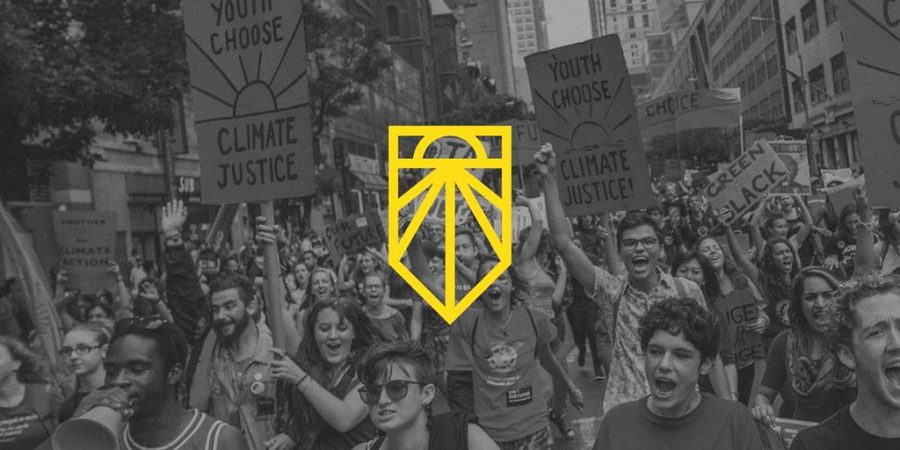On April 22, the day designated as Earth Day, Sunrise Bay Area’s Twitter feed was pushing out more content than usual.
The Bay Area’s chapter of the self-described Sunrise Movement to “stop climate change and create millions of good-paying jobs in the process” disseminated links to upcoming town halls, promoted climate legislation and posted a celebratory photo of the big blue Earth as a reminder of the need to protect it.
The Sunrise Movement was the brainchild of Varshini Prakash, an undergraduate from the University of Massachusetts, and Sara Blazevic, an alum of Swarthmore College. Its purpose as an organization is to advocate for climate change legislation like the Green New Deal by both pressuring existing politicians and promoting new candidates who refuse to take campaign contributions from the fossil fuel industry. They have endorsed candidates like Reps. Ayanna Presley, Alexandria Ocasio-Cortez and Jamaal Bowman, who was recently elected to New York’s 16th Congressional District.
The movement grew to national prominence during the 2018 midterms, joined by Ocasio-Cortez, when it staged a sit-in at Speaker Nancy Pelosi’s office, demanding from her a firmer commitment to tackling the issue of climate change.
This was Adam Singer’s first exposure to the Sunrise Movement, for which he is today a communications specialist. To him, the moral worth of the organization was a driving force to join. “I wouldn’t be giving time and energy to [Sunrise] if I didn’t think that the organization’s goals aligned with a better world,” said Singer.
I think Sunrise has done a lot of great work in endorsing people that are fighting for more change.
— Adam Singer
His call to action stemmed from his belief that waiting on sitting politicians to enact change simply wasn’t viable. To move the needle, grassroots candidates needed to be uplifted in a bid to get fresh blood elected. “I think Sunrise has done a lot of great work in endorsing people that are fighting for more change,” he said.
One of these candidates was Jackie Fielder, who ran for California State Senate District 11 in 2020, losing to incumbent Sen. Scott Wiener. She was endorsed by Sunrise Bay Area, among other progressive organizations such as the California Teachers Association and Our Revolution, as well as the San Francisco Board of Supervisors Gordon Mar, Hillary Ronen, Matt Haney and Dean Preston.
Fielder’s campaign platform, which made a point not to accept money from the fossil fuel industry, included the public takeover of Pacific Gas and Electric, free public transportation and a transition to a zero-carbon economy by 2030.
“It’s unacceptable for anyone elected in California, especially if they’re a Democrat, to continue making choices that affect our everyday lives as Californians and also accept fossil fuel money when we are facing climate catastrophe,” Fielder said in an interview to Xpress.
Fielder is currently the executive director of Daybreak PAC, a political action committee dedicated to funding “corporate-free” campaigns and advocacy efforts across California. She maintains close ties with organizers for Sunrise Bay Area, some of whom are her friends.
“Their work is awesome and should continue,” she said. “I think it’s really inspiring.”
Sunrise’s inspiration is also what led Marrisa Saenger, a Harvard College graduate with a degree in environmental engineering and a secondary in environmental policy, to volunteer with the organization beginning in January 2021.
No matter how much money or lobbying or propaganda we’re up against, we do have the truth on our side.
— Marrisa Saenger
Saenger began with just phone banking, but over the past few months has become an organizer for Sunrise Bay Area. She focuses on planning direct action such as rallies, strikes and marches. To Saenger, mass mobilization is the best means to counter the fossil fuel industry.
“No matter how much money or lobbying or propaganda we’re up against, we do have the truth on our side,” she said. “We do have the moral clarity that all of our futures are at stake.”
Glenn Fieldman, environmental studies professor at SF State, sees grassroots organizing and political action as one and the same. The goal of groups like Sunrise should be to find “pressure points,” as she called them, within the Democratic Party to exploit as a means of pushing the party’s climate agenda left.
“Part of the reason I admire Sunrise and part of the reason I admire people like the squad, is that they actually sat down, and got into the down and dirty and figured out how the system works,” Fieldman said.
The big question mark in all this is the nascent Biden administration’s plans to tackle climate change. According to Fieldman, his approach is being influenced by pressure from progressive politicians like “the squad”, like Reps. Ocasio-Cortez, Omar, Pressley, and Tlaib.
“If you compare what Biden said during his campaign about climate with what he said the day he became president of the United States, you see a big difference,” Fieldman said. “What accounts for that? Pressure.”
On March 31, President Biden announced a $1.9 trillion infrastructure plan known as the American Jobs Plan. Contained within the plan is a $35 billion investment into climate crisis mitigation research, as well as a $50 billion investment in infrastructure resilience to brace the country for the worst of climate change to come. Biden’s plan would put the United States on track to hit net-zero emissions by 2050.









